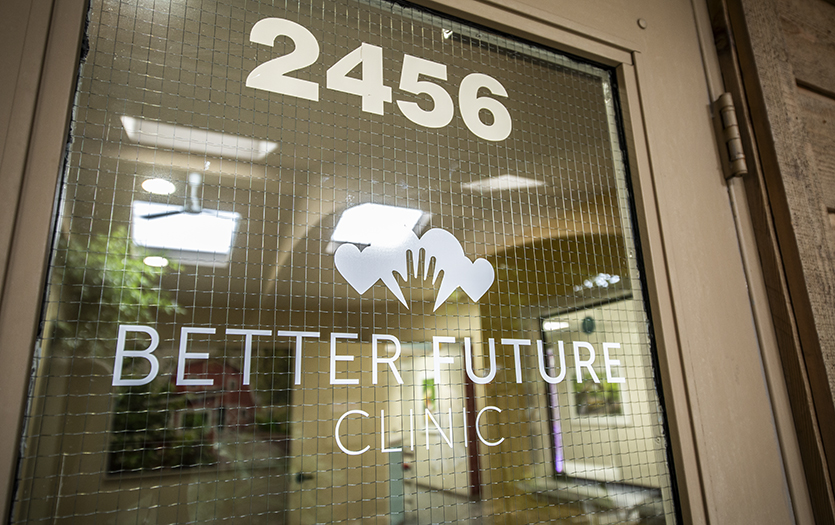Stress can take various forms in children. Some children experience positive types of stress, like the nervous excitement of going to school for the first time or pregame jitters right before kickoff. In these moments, with the help of supportive adults, children can learn from the experience, which makes them more resilient.
But sometimes, children experience toxic stress, such as in situations stemming from trauma, abuse or neglect. This can be very dangerous for young people because it imprints maladaptive behaviors and even physiological consequences.
The Better Future Clinic is a new resource to support children through comprehensive medical follow-up ensuring ongoing care for those experiencing adverse circumstances. Leading up to the grand opening of their new location, we spoke with Tony GiaQuinta, MD, and Lisa Hollister, administrative nursing director, Trauma Services.
Closing the gap
In the state of Indiana, any individual who has reason to believe a child is a victim of abuse or neglect is considered a mandatory reporter. This responsibility often falls heavily on medical professionals, as they are in a unique position to identify signs of abuse that may have otherwise remained concealed in other social settings. Historically, instances of child abuse are often discovered and reported during visits for unrelated medical concerns. However, without a formal follow-up process in place before the Department of Child Services becomes involved, many children remain vulnerable to ongoing maltreatment after discharge.
This deficit has been a point of frustration for many providers. In response, Lisa reached out to the Allen County Health Commissioner and connected with Dr. GiaQuinta, to find a lasting solution. After months of planning and building community partnerships, this collaboration led to the establishment of the Better Future Clinic.
"We have a catch from all of the emergency rooms where if a child is suspected of being abused or neglected, they have a straight shot handoff," Dr. GiaQuinta said. "They can call us and describe their concerns and get them an appointment slot with us so that we can then take the reins."
Although there were numerous motivations for the facility, the primary goal is to ensure children receive timely comprehensive medical attention and families have access to vital community resources.
Providers at the Better Future Clinic are able to take their time and conduct a full physical, dental and developmental evaluation.
Analyses conducted by the World Health Organization indicate ongoing medical care provided to children and families can reduce the risk of maltreatment reoccurring and minimize its consequences.
A healing space
While emergency rooms are critical for events requiring quick action, they're also busy and filled with unfamiliar sounds. For a child who is injured or ill, this setting can be overstimulating and cause additional stress. Recognizing that a calm and inviting atmosphere is essential for healing, Dr. GiaQuinta and Lisa agreed that the clinic's decor needed to reflect that.
Lisa felt that animal scenes and accents would be fun and familiar for area patients. "And so, using that idea, I went to the Fort Wayne Children's Zoo, we took it to our designers and that's how we came up with the idea," Lisa said. This vision can be seen throughout the facility in the multiple murals and animal-shaped exam tables.
Upon arrival, patients are greeted by a child life specialist who helps alleviate any tension and familiarize the patient with the space. The clinic features a flexible layout that encourages children to move about voluntarily and explore at their own pace. Having this freedom allows the child to feel more secure and at ease during their visit.

A better future
While the medical services provided at the facility aim to meet children's immediate health needs, the Better Future Clinic aspires to be a center for strengthening families.
"We know that every parent wants to be the best parent that they can be. And we know that parents love their children, but sometimes accidents happen," Dr. GiaQuinta said. "Sometimes, parents are so stressed that they act out on their children in ways that they're not proud of."
To offer a multi-faceted support system, the clinic collaborates with social workers from Stop Child Abuse and Neglect (SCAN) to provide navigation services for families and address issues that lead to child maltreatment. "There are numerous services available in our community. It's just a matter of knowing how to connect families to those services," Lisa said.
Looking ahead
While those involved in the clinic hope the day will come when these services aren't necessary, the current need is great. "I think the reality is that we'll see the volume increase as the word gets out to healthcare providers," Lisa said.
Dr. GiaQuinta added, "We want to be available for the community to tell us what they need, and we want to service them. We feel like this is a blank canvas, and we're just getting started with the painting."
If you suspect a child is being abused or neglected, call the Indiana Child Abuse and Neglect Hotline at 1-800-800-5556 24/7. DCS will conduct an evaluation and decide if a clinic assessment is needed.
The Better Future Clinic was made possible through the generosity of the Parkview Health Foundation's Shaffer Trauma & Emergency Services Fund and the Community Foundation of Greater Ft. Wayne's Dr. Bill Lewis Isaac Campbell Kidd Fund. Special thanks to our partners, the Mary Cross Tippmann Foundation and the Professional Emergency Physicians, for their commitment to changing the lives of children and their families.



